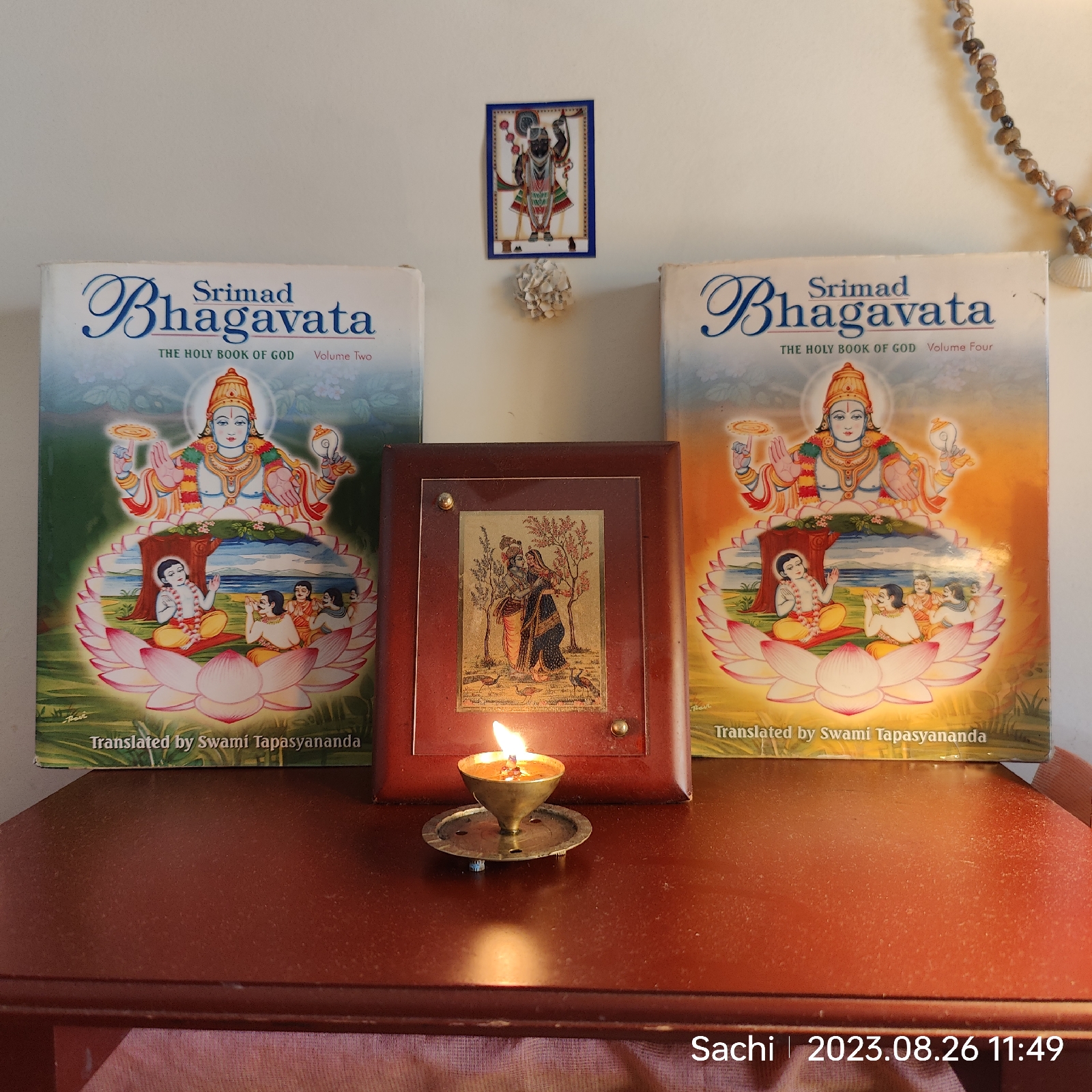https://rsachi.blogspot.com/2022/08/srimad-bhagavatam-105-29-august-2022.html
In this scene, he is sitting in despondency when Devarshi Narada visits him. Narada sports a smile as he travels around the three worlds playing his Veena and instilling Bhakti in all.
Vyasa is asked by Narada to explain his sadness, and he replies:
त्वं पर्यटन् अर्क इव त्रिलोकीमन्तश्चरो वायुरिवात्मसाक्षी परावरे
भ्रह्मणि स्नातस्य मे न्यूनमलं विचक्ष्व
T: “Sage Narada, you move in the three worlds like the Sun,
travel everywhere like the wind, and you know what’s within all as you can enter
into everyone like the Vayu/Prana enters us. So, pray tell me, even after
knowing Brahman, what is lacking in me, why do I feel unfulfilled?”
Indeed, irrespective of age, gender, education, wealth and health, name and fame, we all are after only one thing. That is bliss - that abiding inner happiness that does not increase with indulgence nor wane with time.
Bliss seems to be within us, asking us to reach for it, but we are looking for it elsewhere. I firmly believe that bliss is reached when we find love. Love which is in the moment, and not demanding anything.
Even when we say we love somebody or something, deep within, we know we are loving ourselves, and are seeking a response that gives us bliss. It is easy to intuit that the seed of that bliss is within. It is the first inkling we have of what we call God or Bhagavan. If God is not bliss or love, he does not exist.
Our response to God's or Bhagavan's constant flow of true love is called Bhakti, directed towards the embodiment of love,
eternal and universally present, is Bhagavan.
Sage Narada describes what kind of literary work is to be avoided of we want to develop Bhakti.
तद्वायसं तीर्थमुशन्ति मानसा न यत्र हंसा निरमन्त्युशिक् क्षयाः
T: “Oh Sage, however brilliant a literary work, if it is devoid of devotional inspirations, the Paramahamsas who dwell in the Lord’s abode of bliss and peace avoid them, like swans avoid the inferior lakes habited by crows alone.”
Those wise sages know that any inducements to seek bliss outside are misdirected.
यस्मिन्प्रतिश्लोकमबद्धवत्यपि नामान्यनन्तस्य योशोऽङ्कितानि यत् शृण्वन्ति गायन्ति गृणन्ति साधवः
T: “Even if a work is full of literary mistakes, if it sings of the glorious names of the Lord Achyuta, the saints revel in listening to them, chanting and singing those lines.” He is talking of a literary work since Vyasa is the world's greatest writer.
This means that any work that inculcates true prayer is not a MENSA or PULITZER or GRAMMYwinning expression, because Bhakti is an ardent soul-to-soul interaction. It can even be wordless and silent.
Bhagavan is
Universal
Always loving
Always within us
Always reachable when we seek him/her/it within.
Once we find Bhagavan inside, we will see that Maya is merely a Leela or play in which we are play-acting our worldly roles, whatever they may be. We are connected to the fount of bliss within through Bhakti and are merely play-acting our human lives like ordinary people. This is called Bhagavan’s Vishwa Leela.
We can understand this beyond doubt by going through Srimad Bhagavatam.
That
is the entire subject of Srimad Bhagavatam. Sage Vyasa wrote Srimad Bhagavatam after Sage
Narada instructed him as discussed. That was the end of his despondency.
